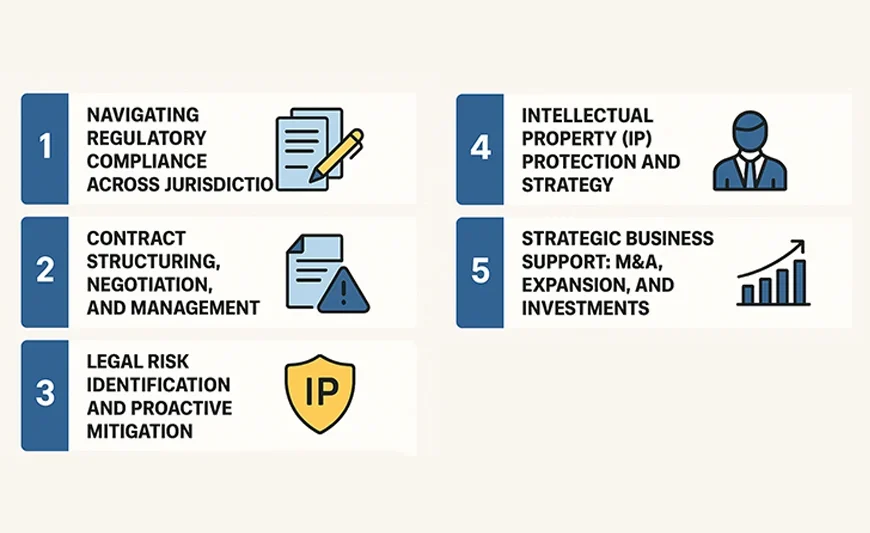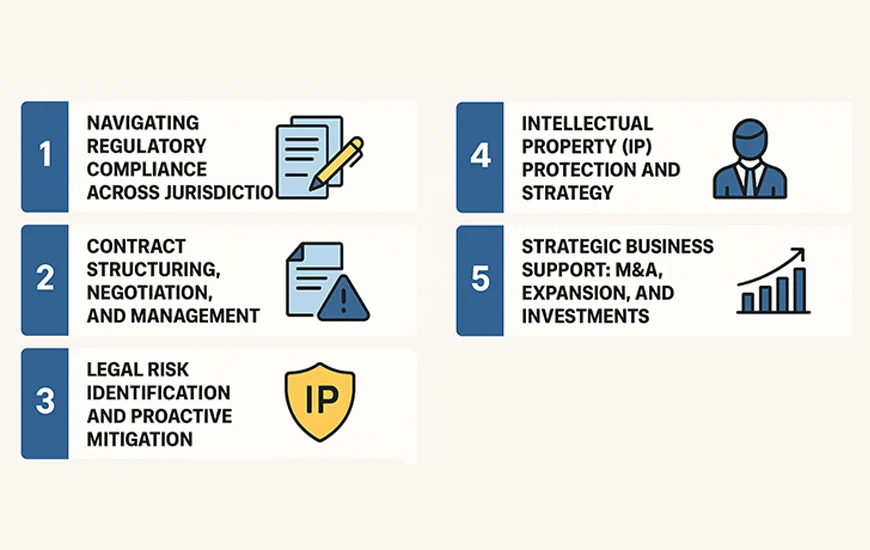
In today’s dynamic and highly regulated business environment, Information Technology (IT) and Business Process Outsourcing (BPO) companies operate at the intersection of innovation, global operations, and intense competition. While technology, operations, and customer service often take centre stage, the importance of legal strategy and compliance cannot be underestimated. Having a strategic corporate legal advisor is not just about managing risks—it’s about enabling sustainable growth, protecting the company’s interests, and supporting key business decisions with legal insight.
Below are five compelling reasons why IT and BPO companies should prioritize having a strategic corporate legal advisor as a part of their leadership and operational framework:
- Navigating Regulatory Compliance Across Jurisdictions
IT and BPO companies frequently operate on a global scale, serving clients from different countries and industries. This exposes them to a complex network of regulatory obligations, including data privacy laws, employment regulations, tax compliance, and sector-specific rules.
For instance, companies handling customer data must adhere to data protection laws such as the General Data Protection Regulation (GDPR) in Europe, the California Consumer Privacy Act (CCPA) in the U.S., Health Insurance Portability and Accountability Act, a US federal law enacted in 1996 and other regional laws like India’s Digital Personal Data Protection Act. Non-compliance can lead to fines, lawsuits, and reputational damage.
A strategic legal advisor helps ensure that internal processes, client engagements, and technology practices align with these regulations. They keep the company updated on regulatory changes and advise on how to implement necessary changes without disrupting operations. More than just avoiding penalties, this builds credibility and trust with clients who rely on compliance for their own business continuity.
- Contract Structuring, Negotiation, and Management
Contracts form the backbone of IT and BPO businesses. Every client agreement, vendor contract, licensing deal, and employment arrangement involves legal terms that determine the company’s rights and obligations. Poorly drafted contracts can lead to confusion, disputes, and financial loss.
A strategic corporate legal advisor plays a crucial role in:
- Drafting and reviewing contracts to ensure clarity, fairness, and enforceability.
- Negotiating terms that protect the company from unreasonable liability or performance expectations.
- Identifying risk clauses such as indemnity, termination rights, intellectual property ownership, and service-level obligations.
- Ensuring standardization of contract language across geographies to maintain consistency and reduce legal exposure.
With experienced legal counsel, companies can build strong and fair contractual relationships that support long-term partnerships and reduce the risk of costly litigation.
- Legal Risk Identification and Proactive Mitigation
Legal risks in IT and BPO sectors come in various forms—data breaches, employment disputes, misrepresentation in client agreements, misuse of proprietary software, and even regulatory investigations. A strategic legal advisor not only addresses legal issues when they arise but also helps the company anticipate and prevent them.
By conducting regular legal audits, the advisor can identify:
- Gaps in compliance practices.
- Potential liabilities in contracts and operations.
- Weaknesses in internal governance and reporting structures.
Moreover, legal advisors help in developing company-wide policies on areas such as anti-bribery, whistleblower protection, IP handling, cybersecurity protocols, and grievance redressal. These policies contribute to a culture of integrity, accountability, and compliance—protecting the company from legal claims and enhancing investor confidence.
- Intellectual Property (IP) Protection and Strategy
For IT companies, intellectual property is often their most valuable asset. This includes proprietary software, algorithms, databases, trade secrets, trademarks, and branding. BPO companies, too, often develop unique service delivery models and tools that qualify as intellectual property.
However, without proper legal guidance, companies may fail to secure or enforce their IP rights—leaving them vulnerable to imitation, theft, or misuse.
A strategic corporate legal advisor helps with:
- Registering patents, trademarks, copyrights, and domain names.
- Drafting IP assignment clauses in employment and vendor agreements.
- Conducting IP audits to identify what assets can be protected.
- Enforcing IP rights against infringement, either through litigation or negotiation.
Beyond protection, legal advisors also help companies monetize their IP through licensing, joint ventures, or spin-offs—creating new revenue streams.
- Strategic Business Support: M&A, Expansion, and Investments
Legal considerations are integral to strategic business decisions such as mergers and acquisitions (M&A), foreign expansion, joint ventures, and funding rounds. These activities involve complex due diligence, valuation of legal risks, negotiations, and compliance with corporate laws and regulatory bodies.
In such scenarios, a corporate legal advisor is essential for:
- Conducting legal due diligence on potential partners, acquisition targets, or investment opportunities.
- Structuring transactions to minimize tax and legal exposure.
- Drafting shareholder agreements, investment term sheets, and regulatory filings.
- Ensuring compliance with foreign investment regulations, export/import laws, and cross-border taxation.
Legal advisors also help with company secretarial functions, ensuring that board resolutions, governance procedures, and statutory filings are carried out in accordance with applicable laws. This enhances transparency and readiness for audits, investor scrutiny, or public listing.
The Strategic Edge
While traditional legal services focus on minimizing risk and handling disputes, strategic legal advisors go a step further by aligning legal priorities with business goals. They are involved in decision-making, policy formulation, and risk assessment at the board level. This ensures that legal considerations are not an afterthought, but a built-in element of strategy and execution.
For IT and BPO companies, which operate in high-speed, innovation-driven environments, having a strategic legal advisor can lead to:
- Faster time-to-market for new products and services.
- Reduced likelihood of legal setbacks that derail growth.
- Stronger positioning during client negotiations and funding discussions.
- Greater agility in adapting to regulatory and market changes.
The IT and BPO sectors are critical drivers of the global digital economy, and their success depends on a blend of technology, talent, and trust. In this ecosystem, a strategic corporate legal advisor acts as a safeguard and enabler—ensuring that growth is sustainable, risks are managed, and innovation is protected.
Rather than seeing legal counsel as a cost centre or reactive support, forward-looking companies view their legal advisors as business partners. By embedding legal expertise into strategic planning and everyday operations, IT and BPO firms can build resilient, competitive, and future-ready businesses.



